Letter of recommendation template for law school
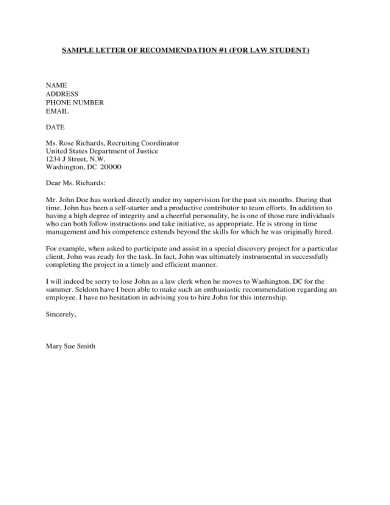
If you want to support a prospective law student, providing a clear and concise letter of recommendation is key. Begin by explaining your relationship with the applicant, highlighting how long you have known them and in what capacity. Be specific about the work or academic achievements that stand out, particularly in areas relevant to law school such as analytical thinking, writing skills, and ability to work under pressure.
Next, address the applicant’s qualities that make them well-suited for the rigors of law school. Discuss their ability to handle complex subjects, their problem-solving skills, and their dedication to succeeding in demanding environments. Include examples that demonstrate these qualities, focusing on concrete instances where they showcased these skills.
Conclude with a strong endorsement, offering your confidence in their ability to excel. Reiterate your belief in their potential, providing a clear recommendation for law school. By being direct and highlighting specific examples, you’ll give the admissions committee a well-rounded view of the applicant’s strengths and future potential in the legal field.
How to Structure a Strong Letter for Law School Applications
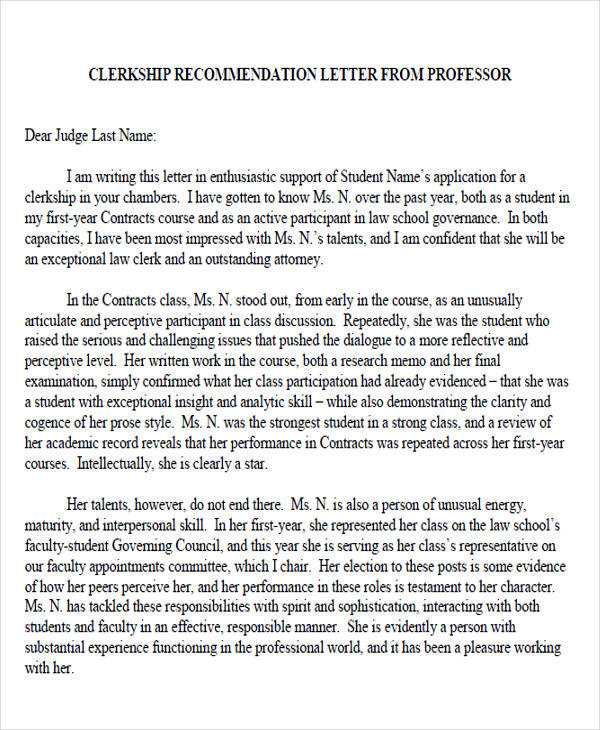
Begin with a clear introduction that identifies the applicant and your relationship with them. Avoid vague statements and instead focus on how you know the applicant and in what capacity, whether it be as a professor, employer, or mentor. Highlight the time period you’ve worked with them to give context to your insights.
Next, move into specific examples of the applicant’s strengths. Rather than general praise, provide concrete situations that demonstrate their skills, work ethic, and ability to handle challenges. For example, describe a particular project, class participation, or a problem they solved effectively, which showcases their readiness for law school.
Address qualities relevant to law school, such as critical thinking, problem-solving, communication, and ethical judgment. Share how the applicant approaches complex issues and how they contribute to discussions or team efforts. Offer details that align with the core competencies law schools value.
Conclude by reaffirming your strong recommendation and mentioning your confidence in the applicant’s ability to succeed in law school. Keep the tone confident but professional. Avoid any ambiguous language that could imply uncertainty about their potential. A direct, powerful endorsement makes a lasting impact.
Choosing the Right Recommender for Your Law School Application
Pick someone who knows you well and can speak to your strengths. Ideally, this should be a person with a deep understanding of your academic abilities, work ethic, and character. Professors or employers who have worked with you closely will be able to provide specific, meaningful examples of your skills and accomplishments. Choose a recommender who can highlight your potential for success in law school.
Avoid selecting people who don’t know you personally or can’t provide relevant insight. Letters from distant acquaintances or those with limited knowledge of your achievements won’t stand out. The goal is to ensure that your recommender can offer a genuine, compelling account of your qualities and readiness for legal education.
If possible, aim for a recommender with a strong professional or academic background, ideally one with experience in law or a related field. A well-respected individual can add weight to your application and lend credibility to their recommendation. However, don’t prioritize prestige over substance–your recommender’s ability to speak honestly and insightfully about you matters more.
Consider the content of your application as well. If you’re applying with a particular focus or interest, choose someone who can speak to that area of law. A targeted recommendation will help demonstrate your alignment with the program’s strengths and your long-term goals in the field.
Finally, ensure your recommender understands the requirements of the law school you’re applying to. Clear communication about the deadline and any specific points the school expects can make the process smoother for both parties.
Academic vs Professional Recommendations: What’s the Difference?
Academic recommendations focus on your academic performance and intellectual abilities, providing insight into your potential as a student. Professors and teachers usually write these letters, highlighting your work ethic, analytical skills, and dedication in the classroom. They speak to your ability to succeed in rigorous academic environments and engage with complex subjects.
When to Use an Academic Recommendation
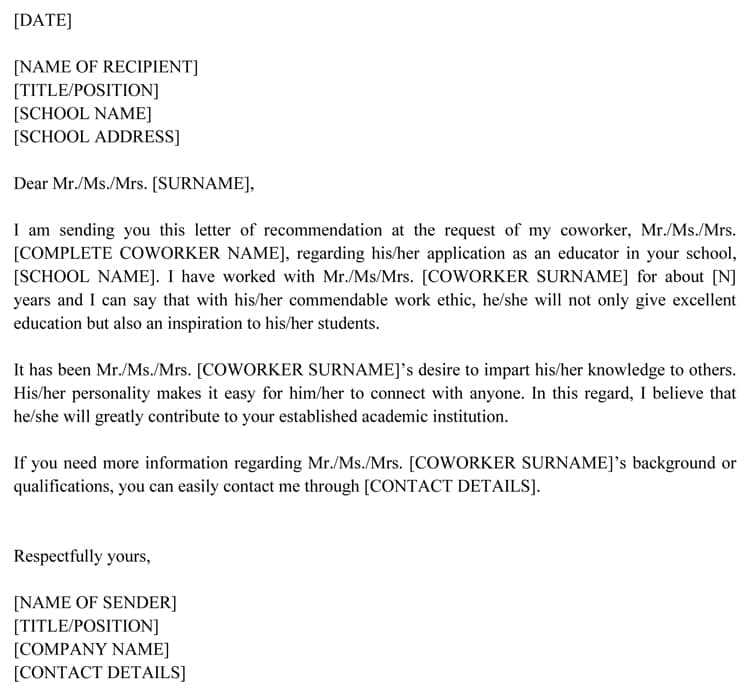
Use an academic recommendation when applying to law schools that prioritize your intellectual capacity and academic background. These letters are most effective if they come from professors who have seen your growth and ability to handle challenging coursework. They demonstrate your potential to excel in the legal field, especially in research, writing, and critical thinking.
When to Use a Professional Recommendation
Professional recommendations, on the other hand, focus on your work experience and accomplishments in a professional setting. These letters are typically written by employers, mentors, or supervisors who can speak to your leadership, problem-solving abilities, and work ethic outside of an academic environment. They offer insight into how you perform in real-world scenarios, collaborate with others, and handle responsibility.
Professional recommendations are crucial when applying for law school if your work experience is relevant to the legal field, such as internships in law firms or volunteer work with legal organizations. These letters can provide concrete examples of how you’ve demonstrated qualities like responsibility, initiative, and communication skills–qualities that law schools value highly.
Common Mistakes to Avoid When Writing a Recommendation Letter
One common mistake is writing a vague or generic letter. Specific examples of the applicant’s skills and achievements make the letter stand out. Include instances where the applicant excelled or demonstrated leadership qualities.
1. Avoiding Personalization
Generic letters fail to show how the applicant fits the unique needs of law school. Tailor the content to reflect the specific skills and experiences relevant to legal studies. Mention the applicant’s dedication, intellectual curiosity, or ability to think critically about complex issues.
2. Focusing Too Much on Soft Skills
While soft skills like teamwork and communication are important, law schools need to understand the applicant’s intellectual capacity and critical thinking abilities. Focus on accomplishments, academic work, and problem-solving skills that reflect these capabilities.
3. Using Clichéd Language
- Avoid overused phrases like “hardworking” or “determined” without concrete examples.
- Don’t resort to statements like “one of the best students I’ve ever taught” without showing why the applicant stands out.
4. Overloading with Extraneous Information
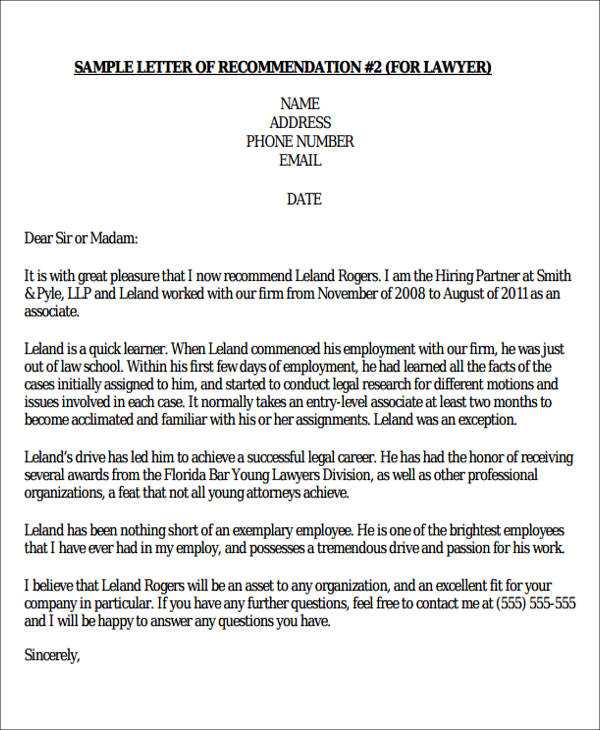
Stay focused on relevant details. A strong recommendation highlights the applicant’s academic achievements, potential for success in law school, and personal qualities related to their suitability for the field of law.
5. Ignoring the Applicant’s Weaknesses
- If applicable, address any areas of improvement in a constructive way, showing how the applicant has worked on these weaknesses.
- Don’t shy away from providing a balanced perspective, but make sure the overall tone remains supportive and optimistic.
6. Writing a Lengthy Letter
A recommendation letter should be concise yet informative. Stick to one page if possible, focusing on the key points that would make the applicant stand out to the admissions committee.
7. Missing a Strong Closing Statement
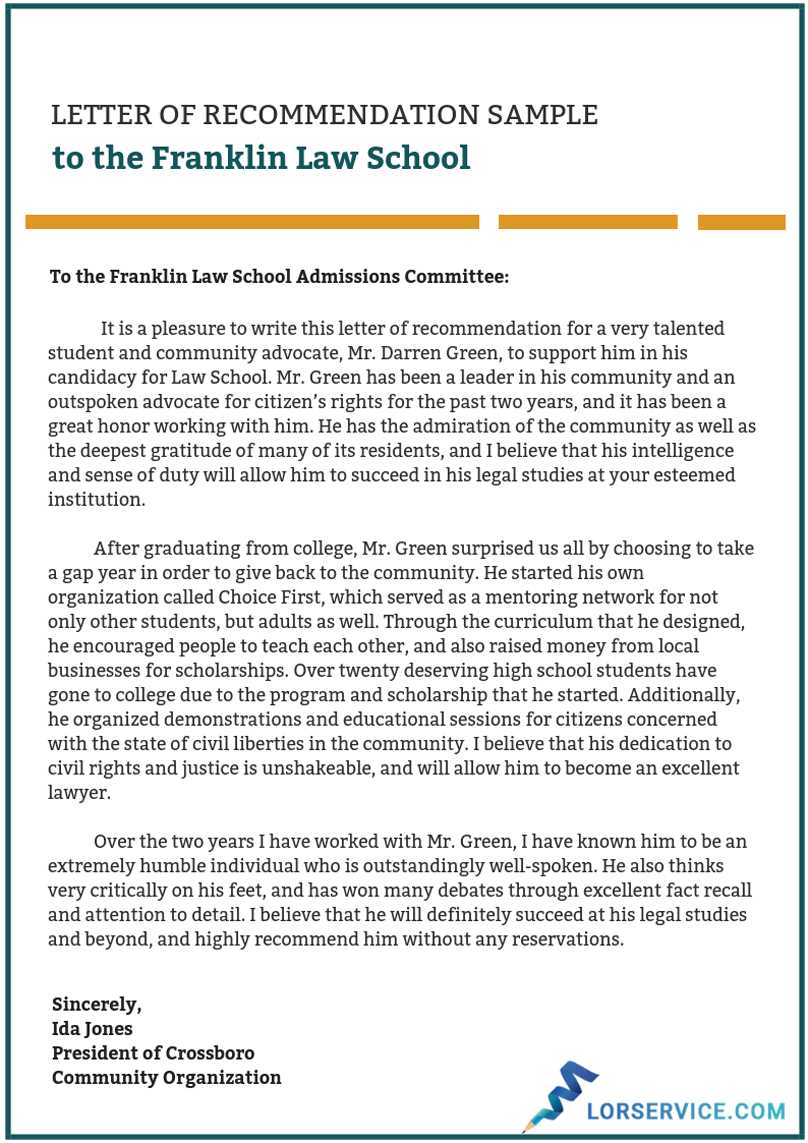
End with a clear endorsement of the applicant’s potential for success in law school. Avoid weak or non-committal statements. A strong recommendation should leave no doubt about the applicant’s readiness for the challenges of law school.
How to Tailor Your Letter to Specific Law School Requirements
Research the law school’s specific expectations before writing. Examine the criteria they prioritize in applicants, such as intellectual ability, leadership qualities, or a commitment to social justice. Address these directly in your letter to align your recommendation with their values and focus areas.
Address the Program’s Unique Features
Each law school has a unique culture and approach to legal education. Identify the characteristics of the program and match your letter to them. If the school emphasizes practical experience or international law, highlight relevant skills or experiences the candidate has in those areas.
Be Specific About the Candidate’s Fit
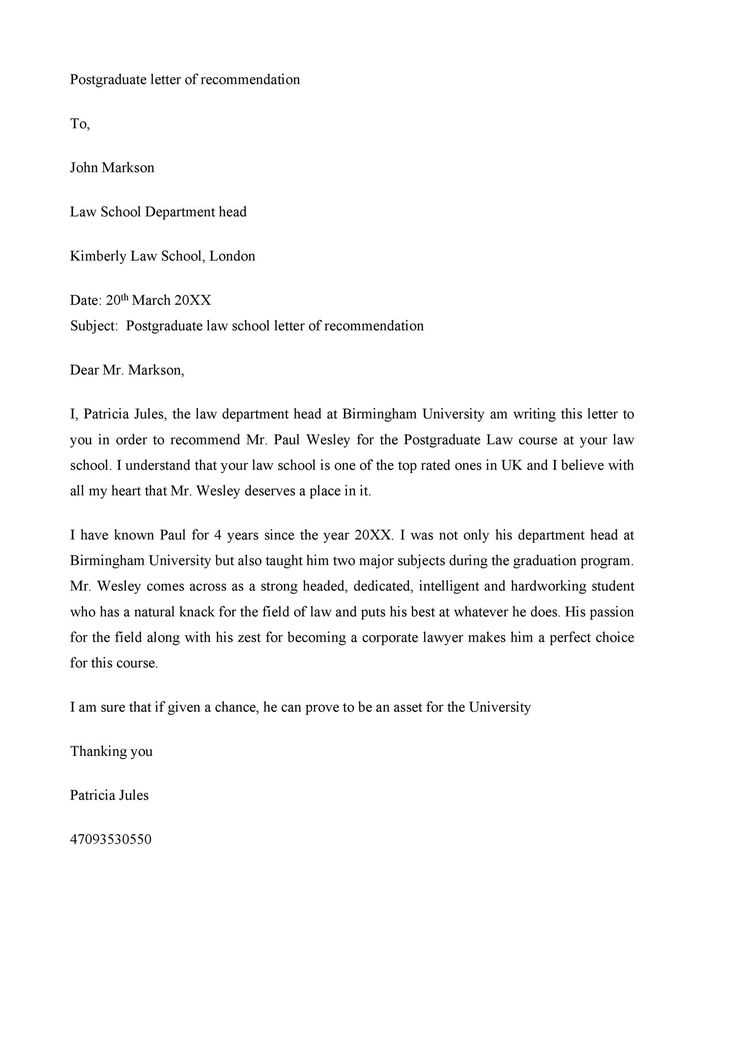
Draw clear connections between the candidate’s background and the specific program’s offerings. For example, if the law school is known for its clinical programs, mention the applicant’s hands-on experience or ability to work under pressure. Tailor examples and achievements that directly correlate with the law school’s strengths.
By focusing on these specific elements, your letter will stand out and demonstrate a clear understanding of the law school’s priorities while showcasing the applicant’s qualifications in a way that matches the school’s expectations.